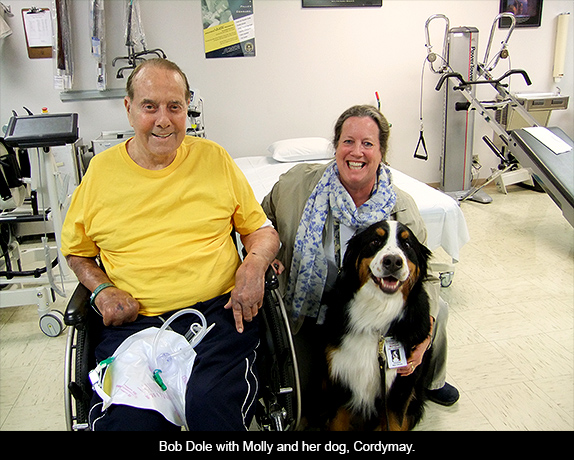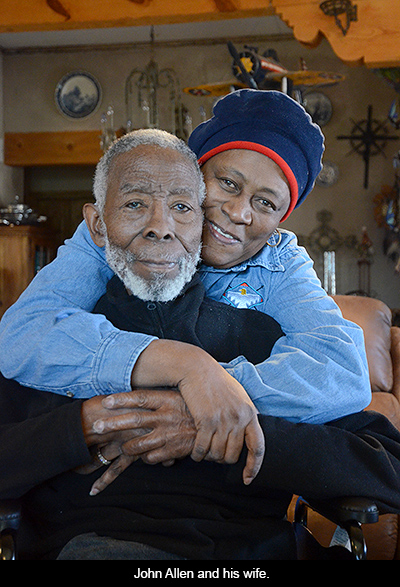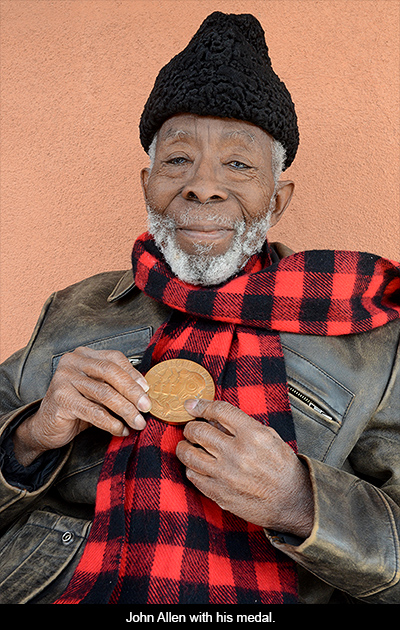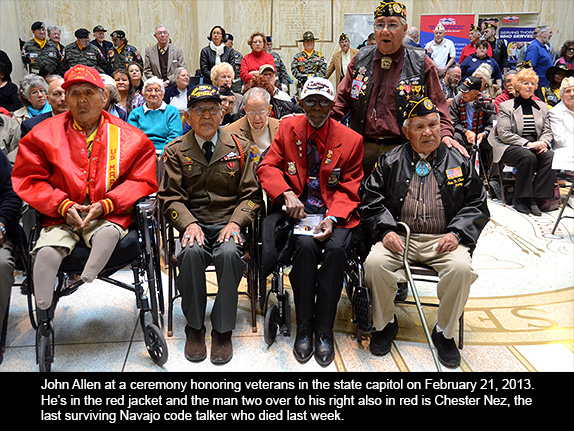When former Senator majority leader and Presidential candidate Bob Dole said that it was time for VA Secretary Erik Shinseki to go, that was the end because Dole, a war hero, wounded veteran, great public servant and frequent user of VA services has more credibility on this issue than any American. Having introduced Shinseki at his confirmation in 2009, this must be a very painful experience for him.
Senator Dole’s comments made me think of my cousin, Molly from Middleburg, Virginia who worked for eleven years as a volunteer at the Walter Reed Army Hospital and then the Walter Reed National Military Medical Center which was a merger with the Naval Medical Center and located on the Bethesda, Maryland campus. She’s a dog lover and headed up a team of dog owners who would visit wounded soldiers at least twice a month. Senator Dole adored her dog, Cordymay and had given orders that he was to be called every time Molly and Cordymay came to visit so they became good friends. I had a chance to meet him on a visit to Walter Reed with Molly and Senator Mark Udall from my home state, Colorado who has been a tireless supporter of veterans.

On Memorial Day, I called Molly to get her reaction to the current VA scandal. This is an enormous system – 151 hospitals, 820 outpatient clinics, 300 VA veterans centers, 3.8 million individuals receiving disability compensation, 56 regional offices, about 22 million vets nationwide of which 90% are men, and even 131 cemeteries. Although she only saw the inpatient part of it as opposed to the outpatient services that are now receiving so much criticism, her comments were fascinating.
First, she praised the dedication of all the commanding officers she worked with in those eleven years. Their commitment and flexibility was in marked contrast to the Red Cross which is heavily involved but extremely bureaucratic. One example concerns a soldier from Durango, Colorado who served in Iraq and Afghanistan, then contracted stomach cancer, perhaps as a result of guarding a toxic waste site in Iraq and was sent to Walter Reed. As he neared death, he asked to be reunited with his dog but the Red Cross said no. Molly went to the commanding officer who simply told her to get it done and she did.

One issue for her is that most families have no idea how to deal with a family member who goes off to war, young, strong and in perfect health and then returns grievously wounded. She cited the case of a young man who lost both arms and legs. His fiancée left him and then his mother said that she couldn’t bear visiting him. Eventually the only person who stuck with him was, surprisingly, the mother of his ex-fiancée. Imagine facing years and years like this, basically alone.
Because she was able to establish a rapport with the various commanding officers, she had great freedom of movement within the hospital. Although many members of Congress would visit, her view was that those visits were often “scripted” or heavily managed by the hospital. Therefore, it’s tough to see the facility as it really functions.
Recently she retired from this work. Cordymay had died and the bureaucracy of the new Walter Reed National Military Medical Center where both the Navy and the Army are vying for control was overwhelming. She was also suffering from nightmares – nightmares about the young man with no arms and legs who was all alone, for example. This is a great loss for the system – a person who has nothing at stake except her care for the patients.
General Shinseki, a war hero himself, is now gone but the underlying issue of a “forgotten military” is unchanged. When I served in the early 60s, the specter of the draft hung over everyone’s head and the military was a major part of our lives. No matter what our personal experiences back then, we all learned that the military – the Army, in my case – was a huge, grinding bureaucracy, one that could only be managed with constant vigilance from family members, the press, political leaders, veterans groups and concerned outsiders like Molly. Now with a volunteer force, we have “farmed out” the protection of our country; for most young Americans the idea of serving your country is a forgotten concept. For most Americans, in general, the military is something distant and unknown. Scandals erupt like the current one but how long will it be before the public’s attention shifts to other issues?

Here in New Mexico where we now live, John Edward Allen, a Medal of Honor winner and one of the last Tuskegee Airmen, recently died. Allen was born in the small town of Lake Butler, Florida in 1929, a time when the KKK was still active there. On the day he graduated from high school, he and 17 classmates joined the military; they wanted to serve their country despite the fact that it was deeply segregated and that they were denied all the basic rights that we take for granted. Although World War II ended before he could serve there, he ended up in the Army for 27 years as a munitions handler, including brutally cold winters in Korea during that war. “Bombs and bullets,” he called it. In his last years, his wife, Willie Esther struggled to get the right care from the VA for him. John, however, never complained. In fact, all he could talk about was his great pride in having been a member of the US Army and having served his country. People like him have to be protected and supported, not forgotten. It’s a commitment for all of us, not just the VA.


Morgan Smith served in the 82d Airborne Division and Fifth Special Forces in the early 60s and now lives in Santa Fe, New Mexico.



Responses to “The VA Scandal”